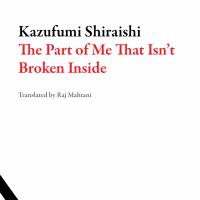Ennui and existential loneliness have become synonymous with contemporary Japanese literature, and those sentiments receive one of their most direct treatments in this newly translated novel from 2002. "The Part of Me That Isn't Broken Inside" is as unrelentingly bleak as its title suggests.
The Part of Me That Isn't Broken Inside, by Kazufumi Shiraishi, Translated by Raj Mahtani.
307 pages
DALKEY ARCHIVE PRESS, Fiction.
Naoto Matsubara is the titular "me," a sexually aggressive misogynist who uses and abuses people with an almost sociopathic detachment. At one point he describes his decision to stop seeing Tomomi, a single mother who is emotionally reliant on him, as being as important as his choice of lunch.
The story, told in a convoluted expository style, edges into his past, unravelling the reasons behind his present state. Along the way he manipulates people and engages in graphic, unpleasantly sadistic sex, dressing it all up in quotes from philosophy and literature, hiding his true nature behind other people's words.
The book is reminiscent of Hitomi Kanehara's "Autofiction," though Kanehara's protagonist is made sympathetic by the inverted chronology, with each revelation turning her from predator to victim. Not so here, where Naoto — perhaps due to his gender and obvious power — never really wins more than our pity. Partly this is because Naoto's attempts to rationalize his actions and their motivations sound too close to justification, and behavior like that can never be justified.
This isn't an easy book to read, but then literature that explores the banality of evil is never going to be.

















With your current subscription plan you can comment on stories. However, before writing your first comment, please create a display name in the Profile section of your subscriber account page.